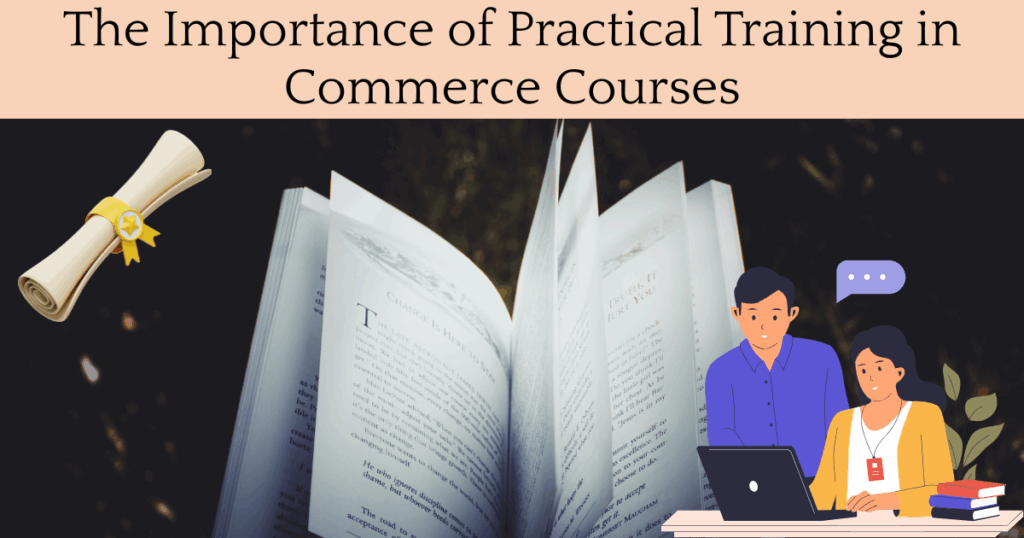The Importance of Practical Training in Commerce Courses. Practical training is important in commerce courses to help students understand the topic in detail. There are many advantages to gaining practical experience to understand more about the course that you are pursuing. Students apply their practical knowledge in a non-classroom environment. Just reading and understanding theory is not enough in most cases, as students will not be able to apply their theoretical knowledge in every field. To know more about the topic “The Importance of Practical Training in Commerce Courses,” read the complete article.
The Importance of Practical Training in Commerce Courses
The significant role of practical training is based on the close connection of theoretical, methodological, and practical action levels in the taste of the discipline “Method of Teaching.” An individual with practical knowledge will be more competent, confident, and consistent than the one with just theoretical knowledge. While academic knowledge offers a solid foundation, it is the ability to apply that knowledge in real-world scenarios that truly sets entrepreneurs apart.

Advantages of Practical Training
There are many advantages to practical training in commerce courses. Some of them are:
Enhances Employability
Practical experience plays a significant role in improving the employability of commerce graduates. The practical experience gained during internships, projects, and other experiential learning opportunities can be a major differentiator for B.Com graduates when seeking employment. Employers choose candidates with practical experience as they are better prepared to handle real-world situations, which can help the organization accomplish its objectives.
Actual Tax Situations Faced
Students can only be properly ready to deal with the complexity and frequent regulation changes in the field of taxes by hands-on experience. Among other things, trainees get instruction on how to complete tax forms, calculate deductions, and apply for credits. In addition, they have the opportunity to hone their skills in income tax return preparation, GST regulation comprehension, and corporate tax compliance. Students gain a broad comprehension of tax laws and their impact on many industries, in addition to developing their technical abilities, through this experience.
Professional Responsibilities and Ethics
The practical component of the CA course also fosters a sense of professional responsibility and ethics. Working on real projects with actual finances teaches students the value of accuracy, confidentiality, and integrity in financial reporting. This firsthand experience in complying with professional standards and ethical guidelines is significant in shaping responsible accounting professionals.
Bridging the Gap With Non-Traditonal Education
Traditional education generally focuses on theoretical concepts, leaving a gap in practical skills development. Understanding this, many aspiring students are turning to non-traditional forms of education to gain hands-on experience and learn from industry experts. By embracing non-traditional education methods, students can guarantee they are provided with the tools and knowledge necessary to thrive in the dynamic world of commerce.
Increases Confidence
Practical experience boosts confidence in the students by offering them the opportunity to apply their knowledge to real-world situations. It helps them build problem-solving skills, critical thinking, and decision-making abilities necessary for their future careers. Practical experience also helps students gain a sense of self-confidence, which can be helpful in their personal and professional lives.
Builds a Professional Network
In the present time, it is essential to have a professional network in this interconnected world. Your professional network is a solid foundation to get unlimited opportunities in professional life. A professional network concentrates on developing deep connections with mentors, peers, and business experts rather than just maintaining a list of contacts. It is a good opportunity for a commerce student to connect with industry professionals to gain insight into job openings, collaborations, and projects that may not be publicly advertised.
Components of Practical Training
You can get practical training via any of the following:
Internship: This is the most significant way of gaining practical knowledge. In an internship, a student is taught to apply the theoretical knowledge in the field. This increases the knowledge and confidence of the student. There are several companies that provide paid and unpaid internships to commerce students.
Case Studies: It is also a common way to get practical knowledge insights. You can study the previous cases to gain knowledge about the situational cases. It is not completely practical but will provide you useful knowledge.
Projects: Making projects can enhance the practical knowledge of a student about the topic. While working on a project, the student gets to know about the topic in detail and also understands the working on it.








